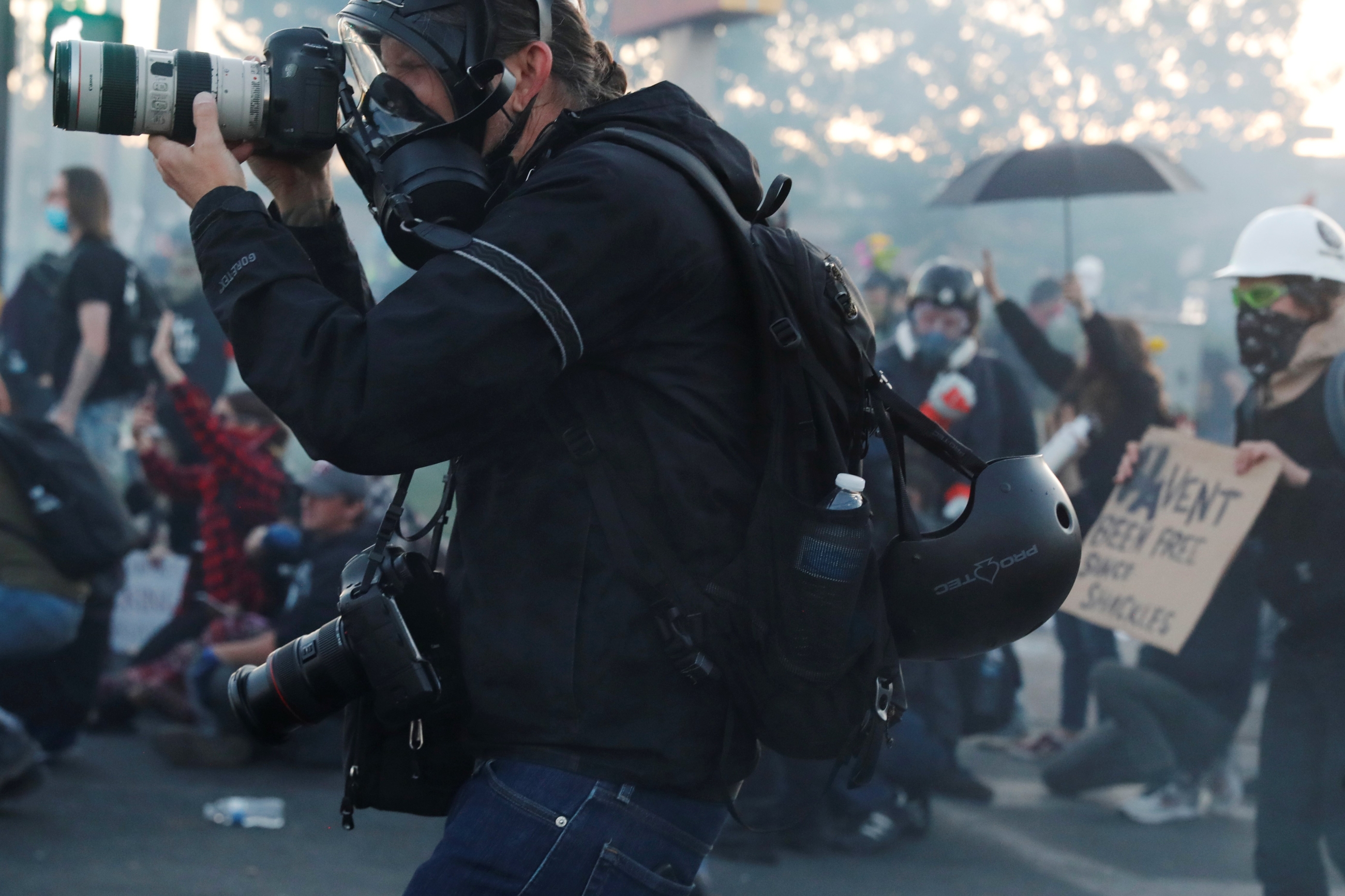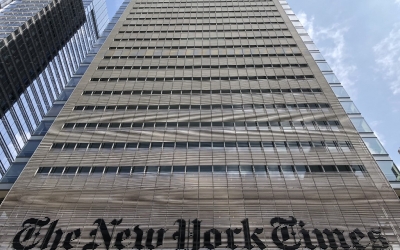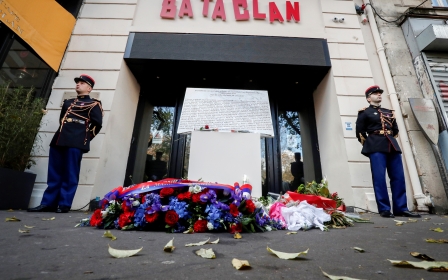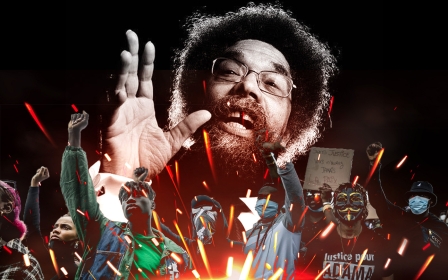How the US media covered up the meaning of George Floyd's murder

In April 2015, I attended a protest in Baltimore, Maryland, for Freddie Gray, a 25-year-old Black man who died of a severe spinal cord injury mysteriously incurred in the back of a police van, where he had been placed for the apparent crime of running away from the cops.
Given US law enforcement’s homicidal track record vis-à-vis the country’s Black community, running seems like a rather logical reaction.
As I made my way from the subway station to the starting point of the march, I passed an alleyway containing four police cars, lights flashing, and a group of Black residents filming the scene with their mobile phone cameras.
When a fifth car arrived, a few members of the group raised their hands in sarcastic surrender - a testament to the effective criminalisation of Blackness in America, which is itself what enables the cops to kill with such regularity.
Changing the narrative
New MEE newsletter: Jerusalem Dispatch
Sign up to get the latest insights and analysis on Israel-Palestine, alongside Turkey Unpacked and other MEE newsletters
The march was entirely peaceful, although at a later point in time some protesters opted to smash up police vehicles and store windows and throw hot dog buns and rocks at the forces of law and order.
There were all the headlines about 'clashes' between protesters and police, as though militarised police and lowly humans are somehow on equal footing in battle
The mainstream media naturally jumped at the chance to run riot, as well, exclaiming in horror over the unspeakable “violence” - by which they of course meant the destruction of private property and not, you know, the severing of Black spinal cords.
Now, five years later, the 25 May police killing in Minneapolis of unarmed 46-year-old Black man George Floyd has triggered mass demonstrations across America and given the media another opportunity to decry looting and shore up a brutal status quo.
Granted, some aspects of the narrative have evolved in a more truthful direction - which is apparently what happens when journalists covering protests are themselves assaulted by the police.
Fox News predictably capitalised on events to sound the alarm that "parts of the nation have seen a surge in certain crimes amid protests and riots," including an “uptick in burglaries, shootings and even, in some cases, murders”. Never mind the murder that spawned the protests.
American media watchdog group Fairness & Accuracy In Reporting (FAIR) compiled a list of the "top 16 euphemisms US headline writers used for police beating the shit out of people".
These ranged from NBC’s “Minneapolis Officers Use More Aggressive Tactics Against Protesters as Rallies Flare Around US” to the New York Times’ “After Curfew, Protesters Are Again Met With Strong Police Response In New York City” to NPR’s "Despite Curfews and Heavy Police Presence, Protests Persist Across the Country".
Then there were all the headlines about "clashes" between protesters and police, as though militarised police and lowly humans are somehow on equal footing in battle.
Incidentally, "clashes" is also a pet descriptor in the mainstream press for the Israeli slaughter of Palestinians - a factoid that potentially acquires greater relevance in light of Israel’s service as a training centre for US police departments.
Indeed, Israel’s vast experience in the realm of human rights violations would suggest that it has lots to teach US cops about waging war against unarmed civilians.
And while there have been plenty of media references to protest areas as “war zones", these almost inevitably cast the vandalisers of private property as the ones perpetrating the war. Much attention has also been devoted to images of police hugging protesters or taking the knee.
As if law enforcement didn’t have their hands sufficiently full with domestic enemy combatants, ABC News reported on 11 June about a US government intelligence bulletin that warns of “malign actors” targeting the US over the fallout of the Floyd murder.
America’s "foreign adversaries", the article specifies, have “flooded social media with content meant to sow division and discord,” and quotes the bulletin’s finding that “these actors criticise the United States as hypocritical, corrupt, undemocratic, racist, guilty of human rights abuses and on the verge of collapsing”.
Well, yeah. You don’t need a foreign adversary to tell you that.
Toeing the line
Over at USA Today, meanwhile, one Julie Mastride - “director of marketing at AllSides, which provides balanced news, media bias ratings and opportunities for civil discourse” - detects social media-fuelled division of a different variety: “partisan online filter bubbles” that, as in the aftermath of the Floyd killing, encourage Americans to “refuse to acknowledge or see other perspectives at all”.
“Objectivity” is a concept journalism loves to erect as a façade while toeing the establishment line and perpetuating a discourse on behalf of power and capital
However, seeing as the gist of Mastride’s piece is that capitalism and Western civilisation are “largely built on good, not evil” - and that “our society is definitely not worth tearing down and replacing with some utopian ideal” - it’s not clear how “balance” fits in, or why it matters if you acknowledge other perspectives if you’re just going to praise the system of racist capitalism that is to blame for Floyd’s killing in the first place.
To be sure, “objectivity” is a concept journalism loves to erect as a facade while toeing the establishment line and perpetuating a discourse on behalf of power and capital.
In the case of Floyd, as the Washingtonian reported, NPR’s managing editor issued guidelines on how not to refer to his killing as a killing: “We can say Floyd died after Officer [Derek] Chauvin was seen on video with his knee on Floyd’s neck… We can say Chauvin is accused of causing Floyd’s death… We can say Chauvin allegedly killed or allegedly murdered.”
So-called "objectivity" purges agency from the equation, rendering language non-committal, hollowed out, and ultimately insignificant - like that time in 2015 when the Washington Post editorial board noted with regard to the fatal demise of a Black, mentally ill Fairfax County jail inmate: “[T]he coroner found that the fact that Natasha McKenna was shot repeatedly with a stun gun while she was shackled was part of the mix leading to her death.”
It’s kind of like describing 9/11 as follows: “The New York City Fire Department found that the fact that commercial aircraft had impacted the Twin Towers was part of the mix leading to a general loss of life.”
Speaking truth to power
Back at NPR, a 4 June dispatch by Kelly McBride poses the question: “Did George Floyd Die Or Was He Murdered? One Of Many Ethics Questions NPR Must Answer.”
Although acknowledging in the first sentence that “a Minneapolis police officer killed George Floyd,” McBride goes on to register her disapproval that Floyd’s previous five-year prison stint for armed robbery has been under-reported.
She voices her hope that NPR staff will “expand… their reporting to do Floyd’s life justice” - by which she means, ironically, highlighting his “criminal past”.
But why not demand, instead, that reporters expand their contextualising endeavours to address America’s institutionalised racism and systemic violence that criminalises Black men in particular, with corporations profiting off of mass incarceration? Because that would be speaking truth to power, which the media are generally loath to do.
So much for ethics.
Jordan T Camp, co-editor with Christina Heatherton of Policing the Planet: Why the Policing Crisis Led to Black Lives Matter, commented in an email to me that mainstream media coverage of the protests sparked by Floyd’s murder has “attempted to cover up the meaning of the event”.
Observing that the “suffering that motivates these uprisings against racism and police violence is often poorly translated[,] neglect[ing] the broader context,” Camp emphasised: “Policing is fundamentally about containing unprecedented inequality amidst perhaps the worst economic crisis in the history of capitalism.”
And, as both police and media work to defend a violent system, it seems the crisis is dire indeed.
The views expressed in this article belong to the author and do not necessarily reflect the editorial policy of Middle East Eye.
Middle East Eye delivers independent and unrivalled coverage and analysis of the Middle East, North Africa and beyond. To learn more about republishing this content and the associated fees, please fill out this form. More about MEE can be found here.





